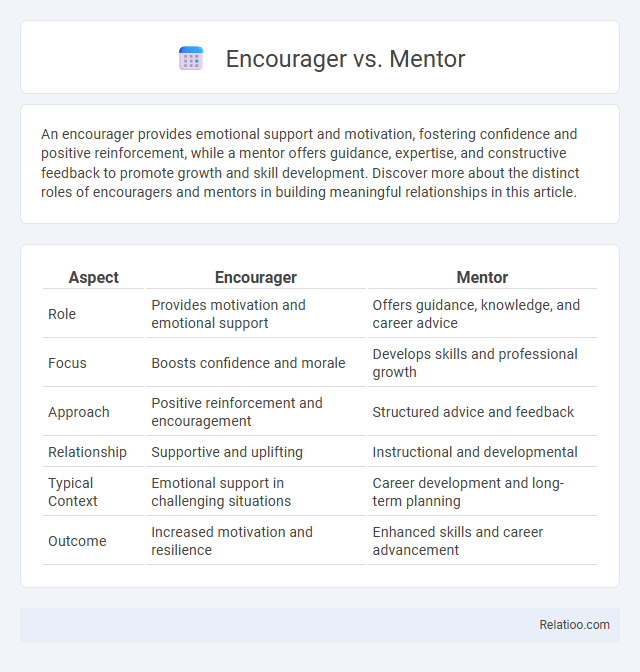An encourager provides emotional support and motivation, fostering confidence and positive reinforcement, while a mentor offers guidance, expertise, and constructive feedback to promote growth and skill development. Discover more about the distinct roles of encouragers and mentors in building meaningful relationships in this article.
Table of Comparison
| Aspect | Encourager | Mentor |
|---|---|---|
| Role | Provides motivation and emotional support | Offers guidance, knowledge, and career advice |
| Focus | Boosts confidence and morale | Develops skills and professional growth |
| Approach | Positive reinforcement and encouragement | Structured advice and feedback |
| Relationship | Supportive and uplifting | Instructional and developmental |
| Typical Context | Emotional support in challenging situations | Career development and long-term planning |
| Outcome | Increased motivation and resilience | Enhanced skills and career advancement |
Understanding the Difference: Encourager vs Mentor
Understanding the difference between an encourager and a mentor is crucial for your personal growth. An encourager primarily offers emotional support and motivation, helping you build confidence and stay positive. A mentor provides guidance with experience-based advice, skill development, and long-term career or personal goals.
Definitions and Core Roles
Mentors provide expert guidance and long-term support, sharing knowledge and experience to help you develop skills and achieve career goals. Coaches focus on improving specific performance areas through structured feedback and goal-setting, often within a set timeframe. Encouragers offer motivation and emotional support, boosting confidence and fostering a positive mindset during challenges.
Key Qualities of an Encourager
An encourager exudes positivity, consistently boosting confidence and inspiring action through affirming words and supportive gestures. Key qualities include empathy, active listening, and genuine enthusiasm, which enable them to uplift others during challenges. Unlike mentors who provide guidance based on experience, encouragers focus on motivation and emotional support to foster resilience and confidence.
Key Qualities of a Mentor
A mentor exhibits key qualities such as deep expertise, active listening, and the ability to provide constructive feedback tailored to your growth. Unlike an encourager who primarily offers motivation, or a coach who focuses on performance improvement, a mentor fosters long-term development through guidance and support. Your relationship with a mentor is built on trust, experience sharing, and personalized advice that drives sustained success.
Communication Styles Compared
Mentors use directive communication, providing specific guidance and expert advice to help you develop skills and achieve goals. Encouragers employ supportive communication, offering positive reinforcement and emotional support to boost confidence and motivation. Coaches focus on coaching communication, asking powerful questions that promote self-discovery and actionable insights for personal growth.
Impact on Personal Growth
Mentors provide structured guidance and expertise, accelerating personal growth by offering tailored advice and constructive feedback. Encouragers boost confidence and motivation through positive reinforcement, fostering resilience and self-belief in individuals. Coaches focus on skill development and goal achievement, facilitating personal progress with strategic support and accountability.
When Do You Need an Encourager?
You need an encourager when facing self-doubt or low motivation, as they provide positive reinforcement and boost confidence. Encouragers focus on emotional support and inspiration, helping you overcome obstacles through affirmation rather than direct guidance. Unlike mentors or advisers, encouragers prioritize uplifting your mindset to foster resilience during challenging times.
When Do You Need a Mentor?
A mentor provides structured guidance and expertise tailored to long-term career growth, making them essential during periods of transition or skill development. Encouragers offer motivation and emotional support, boosting confidence but without the strategic framework a mentor provides. Seek a mentor when you need actionable advice, accountability, and insight from someone experienced in your specific goals or industry.
Can One Person Be Both?
A person can be both an encourager and a mentor by providing motivational support while also offering guidance and expertise in personal or professional growth. Encouragers focus on boosting confidence and morale, whereas mentors share experience and knowledge to foster development. Combining these roles enhances the impact on an individual's progress through emotional support and practical advice.
Choosing the Right Support for Your Journey
Choosing the right support for your journey involves understanding the distinct roles of an encourager, mentor, and coach. An encourager boosts your confidence and motivates you with positive reinforcement, while a mentor offers guidance through shared experience and wisdom tailored to your specific goals. A coach provides structured feedback and skill development to enhance your personal or professional growth, ensuring your path is well-supported and aligned with your ambitions.

Infographic: Encourager vs Mentor
 relatioo.com
relatioo.com